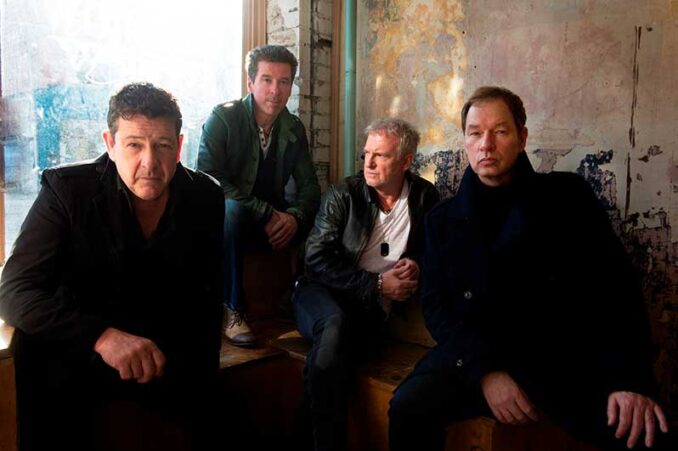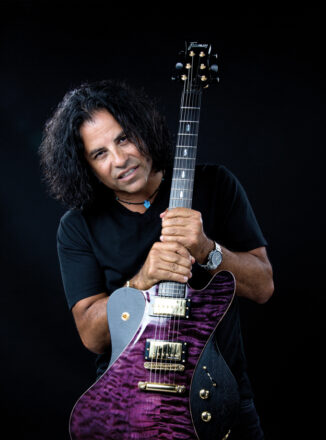
After a run of hits, tours with the likes of Journey and guest appearances by Rod Stewart, Canadian Rockers seemingly disappeared. A couple of years ago they made their first tentative steps back and now, for the first time in 27 years, return to Europe for a couple of shows in the UK with the promise of more to come if all goes well. Mick Burgess called up lead singer Alan Frew to talk about getting back together, the live shows, the reimagined album 31 and the possibility of an all new studio album.
You’re heading over to the UK for a couple of shows in October. Are you looking forward to playing over here again?
I am very much looking forward to it. We’ve obviously been missing in action for a long time and we realise that it’s going to take quite a bit of work on our part to reacquaint ourselves again with the UK. When we do the Rockingham Festival in Nottingham, it’ll be a little easier as it’s a great festival that’ll have a big audience and lots of bands. London will be a little tougher as we haven’t done anything like this in years and we’re not sure what to expect but the band is playing brilliantly at the moment so we’re really looking forward to it.
It’s been 27 years since you last played here. What kept you away?
All I can tell you is it’s just really one of those things. After we did Simple Mission, Alan wanted to do some solo stuff and I set off and did a couple of solo albums in the late ’90’s and into the early 2000’s and people just get distracted with life and families and before you know it years have gone by.
Why is the time right now for UK shows?
There’s been a real resurgence especially over here in Canada and people have been really digging the new CD we’ve put out with all of the reimagined versions of the old hits. We’ve done a three month Canadian tour earlier in the year and have just done some festivals and will be back touring in November in North America so we just felt that when they asked us to come and play at the festival in Nottingham that we’d also have to go and hit London. So, we thought we’d do these dates and try and reacquaint ourselves with our fans and take it from there. We’re big boys. We know if we come back and it doesn’t quite work out that we should try again and maybe get onto a festival and get in front of a big crowd and get to people really quickly. If people come out and see us in London, it’ll certainly push us into coming back again for sure. It’s quite difficult to get back into the game again. People think you just hit the button and go out and headline. It’s tough. I think for us, we need to get out there again. Hopefully playing festivals promoters will see us and see that we can still do it. I still sing everything in the original key and the band is rocking out.
As far as your set list goes, have you had any thoughts on the songs you’ll be playing?
We’ll be doing all of the songs that people want to hear, the hits and the classics. It’ll be a great set that the fans will love.
How have you looked after your voice over the years?
A wee bit of Guinness always helps. My voice is one of those machines that as long as I’m healthy, it’s just very powerful. Hopefully it’ll hold up over the coming years.
As well as the tour, you’ve just released a new album 31 which features new versions of some of your biggest songs and a couple of new songs. Who came up with that idea?
Johnny Reid, who is the guy that produced the album and who wrote Fire It Up for Joe Cocker with me suggested it first. I’d had a stroke in 2015 that set me back about a year. I had plans to release an anniversary CD, maybe of all new songs for our 30th anniversary and I suffered this stroke. During my recovery Johnny had this idea of instead of putting out a bunch of new songs that’d only reach a specific audience that still follows us he said why don’t we reimagine these songs that are already like old friends. I thought it was a brilliant idea. I didn’t just want straightforward remakes, we really wanted to reimagine them and break them down and recreate them so they sounded like you’d just heard them for the first time. I think we’ve done a great job of achieving that.
Did you break them down into their component parts and then build them back up acoustically and then add additional instruments to enhance them?
That’s what we did but when you start a project like this you have to give up control. If you stay in control you’ll probably end up on the path that you were originally so we gave control to Johnny. He had a studio in a barn next to his house. He’d go away and have a think over night and come back to us the next day. When you hear Thin Red Line or Healing Hands they are just completely different to the originals and the only way you can do that is trust. If there was something we didn’t like we could shut it down but that didn’t happen. We wanted to give it a kind of family sitting around at home type of atmosphere as that’s how it was for me growing up, everybody coming over and singing songs on a weekend.
Were there any songs that were particularly tricky to rearrange in this way?
Don’t Forget Me (When I’m Gone) was probably the toughest to do as it had that shuffle beat and was such an iconic song. That being said, a great song is a great song and I think it’s turned out really well. A publisher I knew a long time ago said a great song should be able to pass the campfire test where you can grab an acoustic guitar and sing it. Roxanne by The Police or Help by the Beatles are great songs that’d pass that test. I think all of our songs have transferred really well. I think all in all it’s a great representation of our music.
There’s two new songs on there too. Fired Up, Wae Yer Family. Were those written especially for this release or had them lying around from previous album sessions?
Fire It Up was written for Joe Cocker and I’d started performing it live in Canada when Joe released it over there and it’s such a fun song to perform live. Joe had a huge following, especially in Europe and we thought we’d put our version on the album and maybe some of our European fans would be familiar with Joe’s version and would enjoy ours too. Wae Yer Family was written specifically for this album as if you’re talking about family and friendship around a campfire then we wanted to come up with something to capture that.
You also brought in some guests including Julian Lennon. How did he get involved with the album?
I’ve known Julian for years and we worked together back in the ’80’s and stayed in touch over the years. When I first had my stroke, he was one of the first people that sent me a message and it brought us together again. When we were doing the album, I said to Johnny that if we were going to do this album about friendship and family then Julian should be on it so I called him up and he said yes.
You’ve also got David R Maracle, who is of Mohawk descent and Susan Aglukark, a Canadian Folk singer on Diamond Sun. Were you hoping to catch that traditional native feel to the song?
When the original Diamond Sun came out with the video the First Nation People of Canada really gravitated towards it and became something of an anthem of theirs. We also did a French version of the song for the B-side. This time I wanted the music to represent that we are Canadian so we wanted to have a French version of something on this album so we got in a wonderful singer called Veronica DeClaire and she did Someday. What was also important to us was to have something to represent the indigenous First Nation People so we got Susan Aglukark and David Maracle in and they did a wonderful job on Diamond Sun.
How on earth did you get Rod Stewart to sing on My Town on your Simple Mission album?
Although we’ve lost touch over the years back in the day we’d got to know each other well and we’d play football and have a drink together. I’d written My Town with Jim Cregan who was in Rod Stewart’s band for quite a while. I didn’t want to play that card and ask Rod to sing. I’d worked with a session singer on My Town and one day Rod and I were having dinner and this guy came into the restaurant. Rod actually knew him and he came over for a chat. He asked Rod if he’d heard the song I’d written about Scotland called My Town. Rod asked me why he’d not been asked to sing on it and I’d said that I didn’t want to play that card on him. He just said he wanted to sing on it, so he did and that’s how he ended up singing on it.
You worked with Jim Vallance who was Bryan Adams’ writing partner and has written for Aerosmith and War Machine for KISS on Creatures of the Night. How was it working with him?
I have no qualms in saying that Jim Vallance was the true mentor to Glass Tiger. He was an experienced songwriter and we were not. We’d written some good songs; certainly, good enough for him to be interested but he was a craftsman and he’s written for Tina Turner, Rod Stewart and Aerosmith, the Scorpions and Bryan Adams of course. Jim was a producer on our first two albums and a co-writer on some of our biggest hits. He was an absolute pleasure to work with.
As a band today, you still have a line up featuring 4 original members which is something of a rarity these days. What is it about you that’s kept you together for so long?
We like each other, we care about each other and we are friends. We enjoy each other’s company. When we tour we have fun together and go out with each other. We’re just pals who enjoy being with each other.
Do you still see Michael Hanson your original drummer?
I still see Michael and have written with him. He doesn’t see the other guys as much but we have stayed in touch.
Looking to the future do you have any plans to record an album of all new material?
That was our original game plan before I had the setback and came back with a different approach. We have a ton of stuff ready to go and we’re not finished by a longshot so there will be new material coming from Glass Tiger in the near future.
Glass Tiger play at the University of London Union on 19th October and the Rockingham Festival at Nottingham Trent University on 21st October. See glasstiger.ca for more information.


Be the first to comment